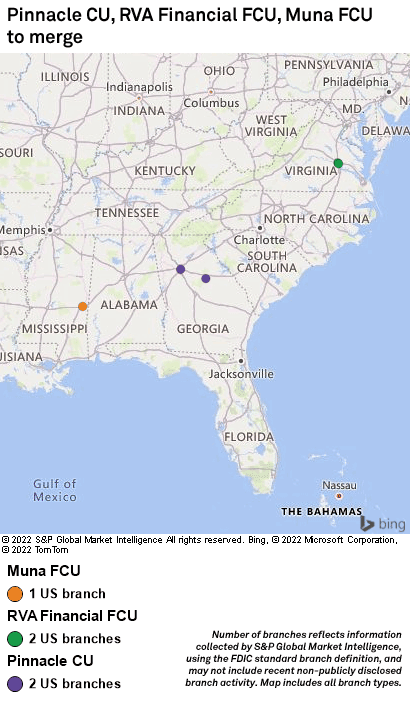A multiway merger involving three credit unions in three separate states across the Southeast was spurred by intensifying competition, increasing regulation and rising expenses. And those companies are open to taking on more credit union or even bank deal partners.
Atlanta-based Pinnacle CU, Richmond, Va.-based RVA Financial FCU and Meridian, Miss.-based Muna FCU on Aug. 30 announced plans to combine in a unique merger of three credit unions. The deal will result in a single credit union with roughly $227.4 million in assets based on the three institutions' total assets at June 30.
The combined organization, which is yet to be named, is open to more partnerships with both credit unions and banks alike.
"Small community banks are struggling just as much as small as credit unions. So we'll put a sign on the door like 'come one, come all,'" said Matt Selke, president and CEO of Pinnacle CU. "All the cards are on the table."
When combined, the new credit union will have 5 branches across Georgia, Mississippi and Virginia. The company plans to fill in the gaps between the scattered footprint; any future mergers will be based more on culture, rather than geographical goals.
"Really it comes down to cultural and philosophical alignment first, then making sure that those fit geographic locations along the way," said Rick Preble, president and CEO of RVA Financial CU.
The credit union's potential merger partners will be limited in Muna FCU's home state of Mississippi. Earlier this year, in an effort to stop credit unions from purchasing banks, the state's governor barred state-chartered banks from selling to institutions not insured by the Federal Deposit Insurance Corp.
"That did put a damper on things," said Bo Pittman, president and CEO of Muna FCU. "That would have been another opportunity, I believe. But I think that we still have ample opportunity with what we're working with in Mississippi."
Pittman is set to become CEO of the combined credit union, while Preble will be COO and Selke will take on the role of CFO.
 |
Facing challenges head-on
The three CEOs have known each other for five years thanks to their joint service on a Credit Union Service Organization board. While each credit union was growing on its own, the three executives started to see the benefits of combining.
"Every single one of us is growing," RVA Financial FCU's Preble said. "But what can we do together that we can't do separately? And that's where we started talking about scale, and we started talking about really being able to save money long term."
Striking mergers of equals can prove tough as cultural issues like management teams and board composition get in the way. But the three institutions and their top executives recognized the benefits of combining to combat intensifying competition, increasing regulation and rising operation expenses, Preble said.
"We're all bringing pieces to the table that can enhance the services that we can give to our members in one fell swoop," added Pinnacle CU's Selke. "Otherwise, it would take us maybe two-to-five years."
Preble cited increasing competition from retail and tech giants like Apple Inc. and Google as one reason for coming together.
The executives also pointed to rising regulatory burdens,
"That's a hefty financial burden to smaller institutions," Selke said. "But when we combine our assets, we can address that a lot easier."
More investments, better retention
As the credit unions achieve greater scale and save money by, for instance, combining back-office functions, it can invest more in technology and talent.
One such investment will be more interactive teller machines, or ITMs. Because RVA Financial FCU currently operates the machines, Pinnacle and Muna will not have to pay for the costs of integration, Preble said.
The combined company will be also be more competitive on compensation. Selke pointed to a recent example in which Pinnacle CU's CFO was approached by a $250 million institution.
"We just can't match that salary at our size. At this size, we won't have to have those conversations. We'll be able to compete to retain talent easier," he said.
The credit unions are also looking forward to sharing products, services and individual talents with each other. For example, RVA Financial FCU answers roughly 95% of calls in its call center, while Pinnacle CU's call center only has capacity to answer about 70% of calls. Along those same lines, Pinnacle CU currently offers business lending products, while RVA Financial FCU does not.



